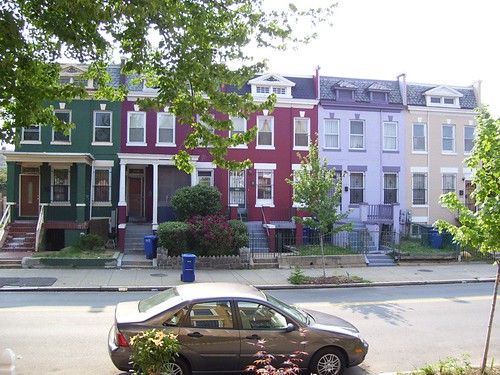One morning on the radio, NPR was doing a story on a question about citizenship to be included on the 2020 census. I understand the worry, as there is the thought that census data was used to help round up Japanese residents and their American born children and put them in internment camps in the desert. My first thought hearing the story is, people could just lie. Digging down into the data for my on-going, long term neighborhood history project I’m noticing this.
People lie about their age. People lie about being married. Some people may be flexible in the racial group they identify with (Lucky C. Young I’m looking at you), which could be interpreted by some as lying about their race.
I’m trying to clean up data for a the Truxton Circle neighborhood history project where I look at the US census for every resident of my neighborhood. In this clean up attempt, I’m encountering lies and things that look like untruths. Take for example my attempt to hunt down Spencer Heywood. According to the 1940 census Spencer Heywood, a 50 year old self employed barber from Georgia who lived at 1649 3rd St in DC with his wife Ethel Heywood, a 37 year old government maid from Arkansas. According to the census he was a home owner. Outside of the 1940 Census, I can’t find any other record of the man. Now Ethel on the other hand….. In 1930 the residents of 1649 3rd St were 41 year old rail road worker Saunders Thomas, and his 30 year old wife Ethel, who owned their home. According to property records, Ethel shows up as the owner in 1924. No mention of a husband. In later records, Ethel and Sanders appear as owners. But in a 1972, when the Redevelopment Land Agency buys her house to (I assume) bulldoze it, the record stated that Ethel Louise Heywood (formerly Ethel Louise Thomas) was the unmarried widow of Saunder Frank Thomas, who died in 1934. Soooooooo, who was that guy at her house in 1940?
Now, I’m just guessing here. She may have been shacked up with some guy named Spencer. Was that the US Federal government business if she did? She was incorrect about her age being 30 years old in 1930 but only 37 in 1940. One of those ages is wrong, but what is it to the government?
This is not a call for people to lie about their citizenship status or any other field on the census. No, please don’t do that. Leaving it blank is a perfectly good answer. Just recognizing that people do and will put in incorrect information in the US Census. And not just the census, other documents I use, like city directories, land records and newspaper articles probably contain misstatements, fictions, and errors. It’s frustrating when you are trying to hunt down someone in the record. I do understand reasons for misstatements for things where the respondent isn’t getting anything of value in return, because some questions are intrusive and probably none of my business, but I really want to know what someone made in 1940 and how much education they had.
I’m reminded of a professor’s whose name I’ve forgotten who wanted me to be more critical of primary documents. Most of the time, 99% of the time, I trust the primary documents. But as I encounter these things with conflicting information, or lies, depending on my mood at the time, my general faith in the documents goes from 99% to 75%. The professor wanted me to take into account the biases of the document creators, and how I shouldn’t just give the benefit of the doubt.
This is an edited reprint of a post published elsewhere.
 So I was rooting around in my electronic files and found this. I’m still pecking away at the Black Home Owners of 1940 in Truxton Circle, but 9th Street NW is more Logan Circle, than our triangular section of Shaw. So, no surprise. Carter G. Woodson, noted African American historian was a home owner, tax payer on Square 365.
So I was rooting around in my electronic files and found this. I’m still pecking away at the Black Home Owners of 1940 in Truxton Circle, but 9th Street NW is more Logan Circle, than our triangular section of Shaw. So, no surprise. Carter G. Woodson, noted African American historian was a home owner, tax payer on Square 365.

